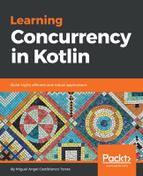I/O-bound, on the other hand, are algorithms that rely on input/output devices, so their execution times depend on the speed of those devices, for example, an algorithm that reads a file and passes each word in the document to filterPalindromes() in order to print the palindromes in the document. Changing a few lines of the previous example will do:
fun main(args: Array<String>) {
val words = readWordsFromJson("resources/words.json")
filterPalindromes(words).forEach {
println(it)
}
}
The readWordsFromJson() function will read the file from the filesystem. This is an I/O operation that will depend on the speed at which the file can be read. If the file is stored in a hard drive, the performance of the application will be worse than if the file is stored in an SSD, for example.
Many other operations, such as networking or receiving input from the peripherals of the computer, are also I/O operations. Algorithms that are I/O-bound will have performance bottleneck based on the I/O operations, and this means that optimizations are dependent on external systems or devices.
